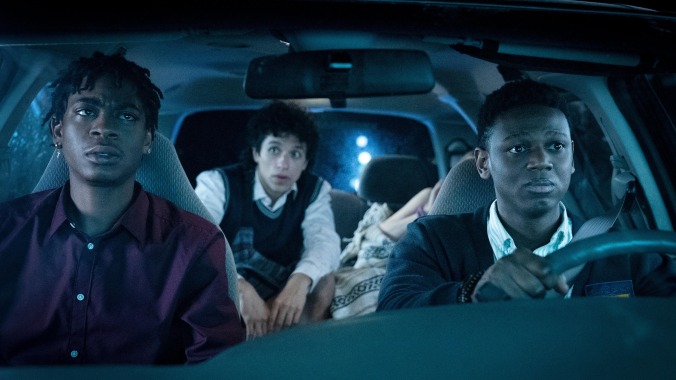Emergency urgently mixes college comedy and social commentary
Strong performances from RJ Cyler and Donald Elise Watkins bolster this story of two Black students trying to do the right thing

No good deed goes unpunished in Emergency, a shrewd social satire that uses the “one crazy night” comedy trope as a Trojan horse to tell a story of racial anxiety and white privilege. Ostensibly about two Black college students who argue over what to do when they find a white girl passed out in their living room, Emergency is really an astute and timely conversation between two characters who represent different sides of the Black experience in America. It’s a cautionary tale of Black anxiety told with stealth, laughs, and just enough feeling, where every decision—even the right ones—must pass through a filter of racial assumptions. While there are moments when Emergency could have benefitted from tighter dialogue scenes and a quicker pace, director Carey Williams (recovering nicely from his first film, the Shakespeare experiment R#J) deftly fires off a lot of rhetorical arrows, and when they hit their target, the comedy really stings.
Williams and screenwriter K.D. Dávila have much on their minds, but wisely prioritize the story’s central relationship, allowing its topical themes to emerge naturally from two well-drawn characters. Emergency eases us in by first introducing opposites-attract best friends Kunle (Donald Elise Watkins) and Sean (RJ Cyler), students at the fictional and predominantly white Buchanan University. Kunle is the more sensitive and serious-minded of the two; the son of high-achieving Nigerian doctors, he’s Princeton-bound for postgrad studies, but still pays close attention to his live culture experiment in the university’s biology lab. The fast-talking Sean, with his ever-present vape pen, seems on the road to nowhere and is more interested in partying and getting laid, two distinct possibilities given the evening’s entertainment: an epic run of seven frat parties in one night called the Legendary Tour. If they manage to hit all seven ragers, they’ll be the first Black students at Buchanan to do so.
One of the film’s canniest choices is making Kunle the son of immigrants. Kunle’s family lineage and wealth suggests he’s less likely to view his American experience primarily through a racial lens. This makes him the opposite of Sean, the realist who knows exactly how things work around here. Early on, the pair are the only Black students at a lecture where the white professor discusses, and repeatedly utters, the N-word. By using such a third-rail epithet, Williams is not just putting the viewer on alert, he’s showing us how Kunle and Sean view the world. Kunle rationalizes the professor’s use of the N-word as part of a valid academic discussion, while Sean is incensed. (Then there’s the white student who offers to “start a movement or something”) Their opposing viewpoints come into conflict when they return home to prepare for their big night, only to find a white girl (Maddie Nichols) unconscious on their floor.








































